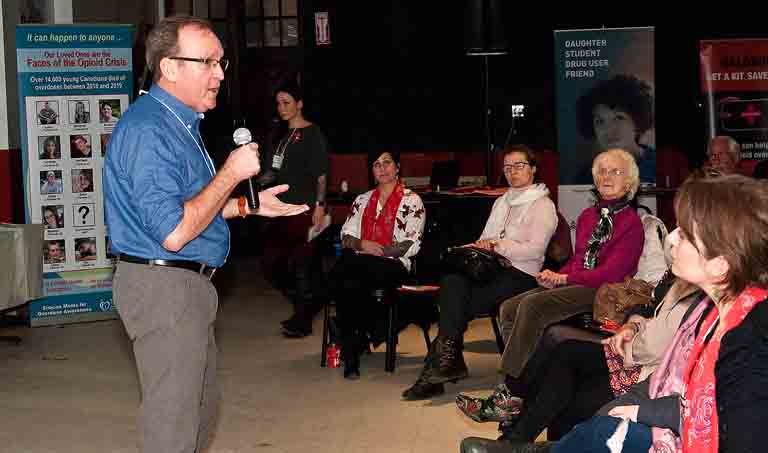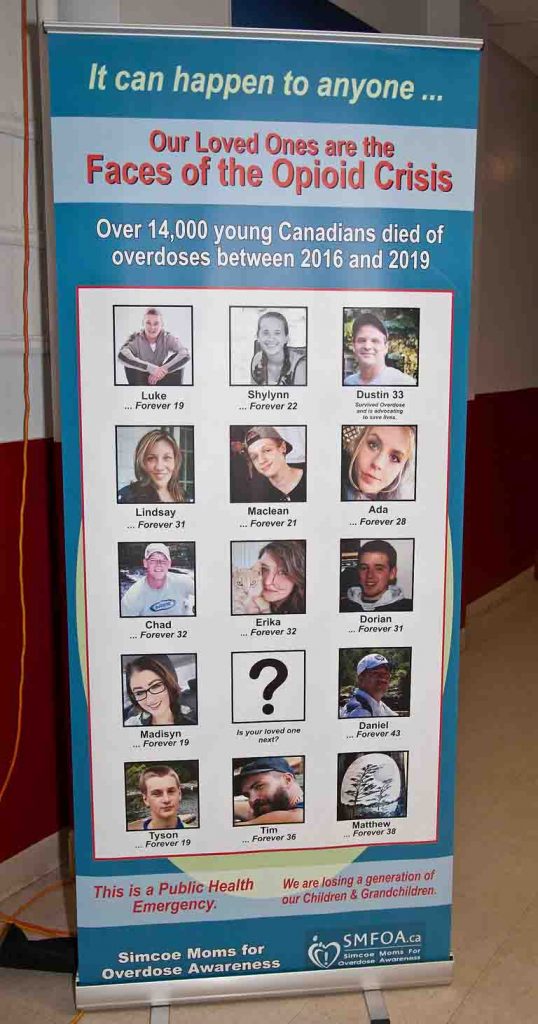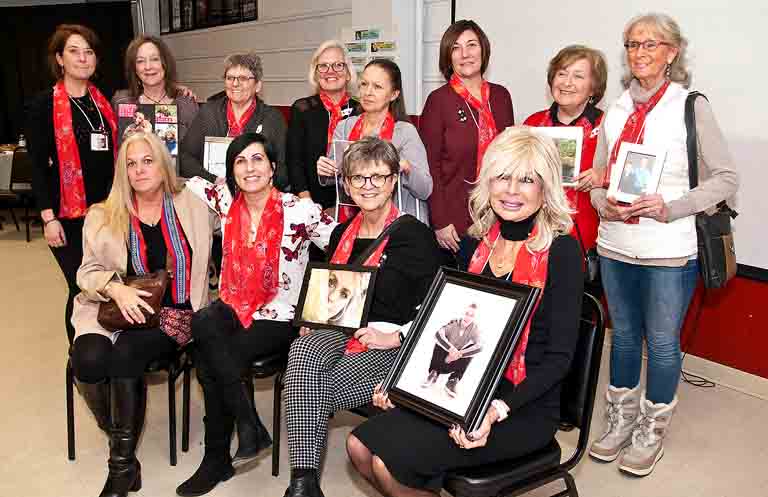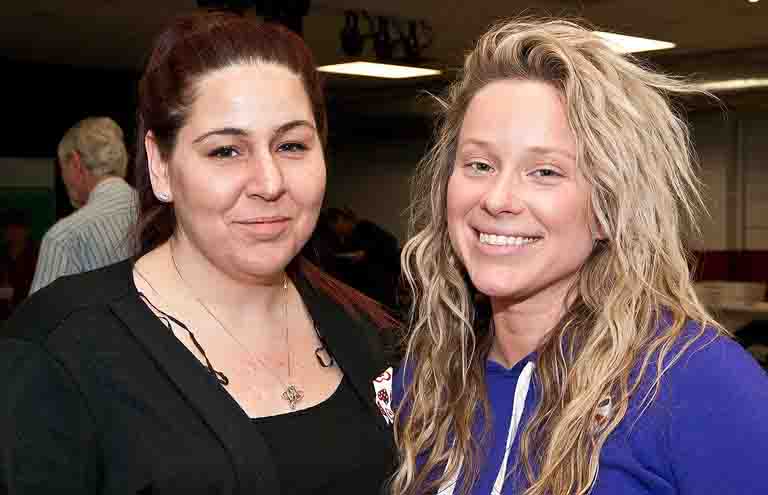EDITORIAL: Opioids, Time For A Change
By John Swartz
“Raise your hand if at any point in your life you tried to change some aspect of your behavior.”
Most of the over 100 people on hand at the Simcoe County Moms for Overdose Awareness (SCMOA) Orillia Talks: Simcoe Moms Raising Awareness event at the Geneva Event Centre to raise awareness of their campaign to get the government to act on the opioid crisis lifted their hands at the direction of Dr. John Weekes, director of the Waypoint Research Institute at the Waypoint Centre for Mental Health.
It’s the same question he posed to an open caucus of the Canadian senate attended by MPs and staffers. Weekes spent 30 years with Correctional Services of Canada specializing in addictions, harm reduction, drug strategy, and treatment outcome research, a good protion of that at the Drumheller Institution (prison) in Alberta.

He’s been an expert witness to the House of Commons and the Senate before and his information lead to changes in impaired driving legislation and the creation of the Mental Health Commission of Canada.
“Keep it up if in changing your behavior, you changed for a while, but then you reverted back.”
One person lowered their hand. “What did you think when you tried to change your behavior and failed?”
“Why would we ever expect from people who have struggled with consuming various drugs, who have been consuming drugs all day, every day, for years, possibly decades, that they are going to be suddenly, magically going to be able to change their behavior?” he said.
It was a side way into getting people to see what people trying to kick a drug or alcohol addiction go through. Many people are trying to quit drugs, but there is a distinct lack of support for their journey.
Regarding opioids, in specific fentanyl (and carfentanyl), as SUNonline./Orillia has pointed out before, and Weekes amplified at the event, we need to start changing the vocabulary if politicians are going to make systematic changes needed.
That is to stop referring to the deaths caused by fentanyl as overdoses.
“How can you overdose when you don’t know what you consume?” he asked. And that strikes to the heart of the matter. No one, for the most part, willingly takes fentanyl. It’s almost always mixed into other drugs by dealers as an ‘enhancement’ designed to create more customers for the ‘better’ weed, coke, or what have you. It’s usually their one and only time taking fentanyl.
“I’ve taken it (overdose) out of my vernacular. It’s death by drugs. It’s drug poisoning.”
That’s a start, and one that should begin to convince more people drug addiction needs to be looked at very differently than authorities perpetrating a War on Drugs have lead us to believe we should view it.
Getting Over It

“The evidence is clear that when you engage in this class of behavior, you consume these drugs over time you change your brain, like you are somehow supposed to be able to magically just stop.”
The truth is, many people started on their addiction journey because they were prescribed pain killers for injuries. Then the prescription ran out and one of two things happened. Either their dose was too strong and they became dependent on their drug in ways beyond pain management, or no thought was given to reducing prescription doses logically and they were supposed to go cold turkey onward with their life.
The rest were doing drugs recreationally and one day found it wasn’t recreational anymore. This does not include marijuana users, the overwhelming majority of people smoking dope never develop any kind of addiction, except to Taco Bell, pizza and chocolate chip cookies.
Recreational drug use is where Dustin Richardson’s story began. The 33-year-old is a recovering addict from Barrie. He was at the event to tell his story of coming back from the brink of death (he said he’s had to be revived 30 times). He started using drugs at 17 with Oxycontin (oxycodone). For those who grew up through the 60s, and 70s, even the cocaine fueled 80s, it seems like an odd place to start a drug habit.

“I started to have some physical dependency issues. I went to my doctor and my doctor prescribed it to me for a little while in hopes of weaning me off, but he over-prescribed and kept me on it for a decent amount of time,” he told me.
The next step was fentanyl. Certainly my eyebrows raised a bit. Why would anyone knowingly take fentanyl? It turns out on the streets of Toronto there was a trade using fentanyl patches, usually leftovers from prescriptions or stolen. Those have aren’t the same as what is found in other street drugs, having been manufactured as prescription drugs with dosage and quality controls. But, as Richardson said, those limited doses don’t mean much when you start using two or more patches at once.
He also said something disturbing. fentanyl patches are not on the streets so much anymore, but the heroine people are buying isn’t really heroine either. It’s some variety of powered for bulk cut with fentanyl. That’s scary.
He’s taking methadone now and spends his time counseling others trying to get clean. He has a solution to our drug problem.
“That solution is, it’s called safe supply. It’s a government issued, pharmaceutical grade heroine for addicts that have tried to get on and off and failed. They go to a place that’s regulated, clean, you know the potency, you know your dose, you can get on it, you can get your family back, you can get working and over time you can get off of it.” There’s one more component to it, he said he’s got people around him now that he calls his community, supporting his effort to stay clean and eventually off the methadone too.
Dr. Weekes is of the same frame of mind. He told the audience in Ottawa where he lived there are only 2222 treatment beds when statistics show that 10 to 15% of the population has some kind of drug or alcohol problem. For a metro area of 1 million people at 15% that’s 147,778 too few beds.
He voices the concern of many with a good understanding of the problem. Have you ever tried to discuss this issue with someone who still thinks jail is the best answer? That a young person’s natural feeling of immortality to the things others become susceptible to means they can handle it – until they can’t?
“We continue to laden this with so much moral overtones to this, that its somehow a moral failure to not somehow be able to cope or get themselves out of a situation,’ he said.
“The evidence is clear that when you engage in this class of behavior, you consume these drugs over time you change your brain, like you are somehow supposed to be able to magically just stop.”
“That’s’ why you need supervised consumption sites, why you need alternatives. There’s so much (literature) around harm reduction it’s crazy. Why? Because people can’t change,”

The One-Time Forever Aftermath
In the audience were many people you know. Not that I’m special, but I know better than three quarters of those who were there. This is how bad this crisis has become here in Orillia.
Some of those who attended got introduced to the life of a parent, sister, brother, other family member, or friend without a living, breathing person they’ve always known as recently as December. Others have had some time to heal somewhat.
There was a mixture of determination and a fresh shock of finding themselves at such an event. You could tell the ones who are newly grieving from those who have found away to put their grief to use. Some of the mothers of the latter group look like you don’t want to get in their way on this issue.

“I promised Erica and myself I would live for both of us, and that her death wouldn’t be for nothing,” said Jess Mogan, through tears, as she wrapped up telling her story, and that of her life-long friend, to the audience.
That SCMOA is gaining membership is an indication of failure on all of our parts to put pressure on government to do the right thing, to not pretend there are reasons, like appeasing those who oppose treatment centers, for their inaction. Sooner of later, likely sooner at this pace, you will be able to say you know someone who died from opioids.
The victims come from all walks of life. There many whose passing caused ripples to go through the community, those who no one knew had a drug problem. Look at the picture of the moms above again. You probably know one or two of them. Don’t become one of them because of tragedy of your own.
Talk with your family, or rather listen to them. If they were ever on pain killers, there’s a chance they still are and you don’t know it. Talk to your children about what they are doing for kicks. You can’t stop them, but you can steer them to make better choices – after all there is a good source now for marijuana and other jurisdictions where it has become legal report drastic drops in opioid use.
Oh, and sign the petition SCMOA has. Until people can stop going to the street corner, the alley, that house down the road with non-stop traffic in and out of it, and make use of a system designed to help them, SCMOA will probably have to admit new members, but it doesn’t have to be that way.
(Photos by Swartz – SUNonline/Orillia) Main: Orillia Talks: Simcoe Moms Raising Awareness audience.

